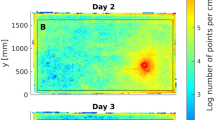Summary.
Following chemical trails to food sources has been well documented in ants, but extra social chemical learning in these organisms is virtually uninvestigated. The "topochemical sense" hypothesis, presented a century ago, proposes that foraging ants navigate using local 'chemical emanations'. This hypothesis is supported by the results of our study in which black carpenter ants, Camponotus pennsylvanicus, on their way to and from a food source, learned to identify a place on their route by recognizing preexisting chemicals of plant substrates. They associated this learned chemical stimulus with the decision to climb vertically in order to find food.
Similar content being viewed by others
Author information
Authors and Affiliations
Additional information
Received 3 January 2002; revised 31 July 2002; accepted 13 August 2002.
Rights and permissions
About this article
Cite this article
Helmy, O., Jander, R. Topochemical learning in black carpenter ants (Camponotus pennsylvanicus). Insectes soc. 50, 32–37 (2003). https://doi.org/10.1007/s000400300005
Issue Date:
DOI: https://doi.org/10.1007/s000400300005




